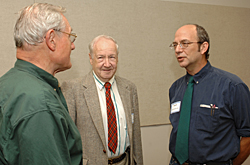
Daoism (also known as Taoism) is a metaphysical philosophy with distinguishing linguistic features, Fox said. He interprets metaphysics to mean “theory of reality.” Unlike Plato, who is concerned with the abstract, Daoist metaphysics is concrete, emphasizing the reality of everyday as opposed to the ideal.
Fox pointed out that Dao De Jing was impossible to translate totally. Some of the characters have become obscure with time, the text is taken out of the cultural reference of the period when it was written and also has a complicated editorial history. In classical Chinese, there are no parts of speech, he said, as nouns, verbs, adjectives, tenses, articles and capital letters do not exist. It's as far from English as you can get, he said.
There is no equivalent of the verb “to be,” Fox said. In the sentence, “the book is on the table,” “is” is an affirmation of existence. Daoism would express the idea by “the surface of table has a book.” Instead of saying the “table is over there,” the concept is “tabling is going on,” meaning nothing stays the same but is in a state of processing and changing. A table was once a tree, Fox said, and is still undergoing dynamic change. All things are “Daoing,” or processing.
Fox drew the Chinese characters for Daoism, and said they represented a foot and a chief's headdress. Generally known as “The Way,” Fox interprets the characters to mean, “the way the leader walks.” Daoism is about striving for the ideal, which can never be attained and is always met with interference.
He referred to a long jumper Bob Beamon, who made what was called “the perfect long jump” at the Olympics in 1968, exceeding the record by a few feet. “But of course, it wasn't the perfect jump,” he said. “His record was broken and will be again,” noting that Daoism deals with the dynamic qualities of reality and encourages individuals to seek a personal destiny by striving to get closer to the ideals of their goals.
UDARF officers are Bob Stark, president: Joachim Elterich, vice president; Barbara Viera, secretary; and Michel Pohler, treasurer. Other members of the executive committee are Helen Morgan, webmaster; Dorothy Moser, past chairperson; and Theodore Braun, Elbert Chance and Judy Van Name, members at large.
The next general UDARF luncheon meeting is scheduled for 11:30 a.m., Tuesday, Dec. 4, at Clayton Hall, when Nancy Targett, dean of the College of Marine and Earth Studies, will speak.
For more information, visit [www.udel.edu/UDARF].
Article by Sue Moncure
Photo by Kathy F. Atkinson

